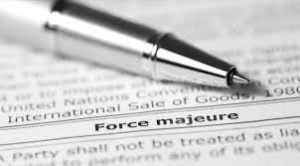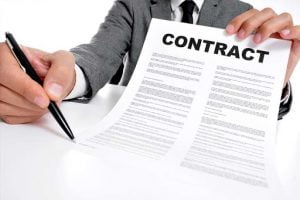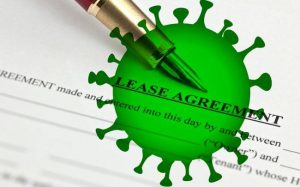Should You Add a COVID-19 Clause to a Real Estate Contract?
Go Back To Previous PageWhen the world saw COVID-19 first take hold in China, no one ever expected life to change drastically. 2020 marked one of the most uniquely terrible years in world history. The pandemic shut down the majority of businesses. Also, it made many people penniless overnight. This led to most providers and state legislatures passing efforts to alleviate the stress of COVID-19’s impact. Each industry came up with a way to make it easier for people to survive during this economic turmoil. One of the most common ways landlords improved their chances was to add a COVID-19 clause. But what is it, and how do you make your clause work for you and your client?
terrible years in world history. The pandemic shut down the majority of businesses. Also, it made many people penniless overnight. This led to most providers and state legislatures passing efforts to alleviate the stress of COVID-19’s impact. Each industry came up with a way to make it easier for people to survive during this economic turmoil. One of the most common ways landlords improved their chances was to add a COVID-19 clause. But what is it, and how do you make your clause work for you and your client?
What Is A COVID-19 Clause?
A COVID-19 clause is a rider or a waiver added to a purchase or rental agreement in real estate. It’s a rider designed to help people protect themselves from sudden mishaps and protects them from delays that could happen due to the COVID-19 crisis. These ensure that either party has an “easy out” or a little leeway during a real estate transaction during the age of COVID.
What Exactly Does A COVID-19 Clause Do?
There are multiple types that you could create. The most popular ones involve stipulations like the ones below.
- Leeway Clauses/Deadline Extension Contract Rider. These state that if you can’t finance or otherwise can’t go through
 with a transaction at a given time due to COVID-19, you can request extra time. Usually, these leeway clauses will give you a couple weeks to get your situation together. If your buyer cannot get the money by the time the leeway period is over, the parties cancel the contract automatically.
with a transaction at a given time due to COVID-19, you can request extra time. Usually, these leeway clauses will give you a couple weeks to get your situation together. If your buyer cannot get the money by the time the leeway period is over, the parties cancel the contract automatically. - Backout Clauses/Funding Contingencies. These contingencies say that you can cancel a pending sale if funding falls through due to losing your job due to COVID-19. Should a client back out due to COVID-19 issues, and will the earnest money they put down to be returned to them?
- Lease Termination Clauses. If your tenant gets COVID-19, a lease termination clause will allow them to end the clause so they can move to a more affordable location.
Is There A Prefabricated COVID-19 Clause You Can Use?
After the pandemic hit New York City, the state created a boilerplate clause to help provide relief and legal protections to buyers and sellers. If you want to add the standard boilerplate clause to your offer or transaction document, you can check it out on NYSAR.
Are You Legally Mandated To Add A COVID Clause To Your Transaction?
New York City loves regulations, but this is not a regulation it has. In other words, a COVID-19 clause remains optional. However, it is encouraged by most New York housing boards. If you want to add it, by all means, do.
housing boards. If you want to add it, by all means, do.
However, it’s not mandatory, so you will not be penalized if you decide not to include it.
When Doesn’t It Make Sense To Add A COVID-19 Clause To Your Real Estate?
Now that things are opening up again, one could argue that the widespread vaccinations and better understanding of the disease made the need for all this COVID-19 assistance moot. However, we are still in a pandemic, and it’s becoming clear that it comes and goes in waves.
So on that front, you can use your judgment to determine whether or not it makes sense to have a clause in your contract. That said, it’s an excellent courtesy to offer and can help protect you from incurring losses in some situations. It’s up to you to decide whether you want that additional cushion for COVID-19 risks.
When Does It Make Sense To Add A COVID-19 Clause To Your Real Estate?
Honestly, a large portion of the COVID-19 crisis has come and gone. Life is a lot more normal than it was a year ago. However, we’re not out of the woods quite yet. This is especially true in New York City.
woods quite yet. This is especially true in New York City.
You might have a more significant issue: the freeze on move-ins/move-outs that many condos and co-ops still have.
Depending on how things go, there’s a good chance that some communities will freeze move during a fourth or fifth wave. This could make moving in and transitioning difficult. If you want to avoid this issue, adding a COVID-19 clause to your real estate transaction makes sense.
Can You Evict A Tenant Who Doesn’t Pay Rent During The COVID-19 Crisis?
The rules on this all depend on the situation. New York City has pretty strict and measured eviction laws, especially when it comes to particular circumstances. The basic gist of what landlords and renters should know is as follows:
- Your client must file a hardship form to extend their rent to May 1. After May 1, the eviction moratorium is over, and you can evict your client regardless of how bad they have it off. Before this, landlords in NYC could not evict tenants before December 31.
- If another devastating wave of COVID cases arises and another national emergency is declared, you cannot legally evict your tenant until the moratorium is over. NYC has a track record of taking COVID-19 very seriously, and rightfully so. With that said, moratoriums are pretty rough.
- You can find available resources if your income or building mortgage relies on your tenant making rent. Besides the eviction moratorium, many lenders offer loan provisions for homeowners and rental property owners in need.
Is This A New Type Of Clause?
While the COVID-19 clause itself is new, its concept is pretty old. Most people don’t realize this (or forgot about it), but people have used similar event-specific provisions during times of significant economic upheaval. The most recent clause of this type before COVID was a clause that absolved renters and buyers of responsibility during the Great Recession.
event-specific provisions during times of significant economic upheaval. The most recent clause of this type before COVID was a clause that absolved renters and buyers of responsibility during the Great Recession.
Whether you want that protection in your contract is up to you. If you aren’t sure whether it’s the right move for you, call up your real estate agent and real estate lawyer, and talk about it.
 with a transaction at a given time due to COVID-19, you can request extra time. Usually, these leeway clauses will give you a couple weeks to get your situation together. If your buyer cannot get the money by the time the leeway period is over, the parties cancel the contract automatically.
with a transaction at a given time due to COVID-19, you can request extra time. Usually, these leeway clauses will give you a couple weeks to get your situation together. If your buyer cannot get the money by the time the leeway period is over, the parties cancel the contract automatically.

